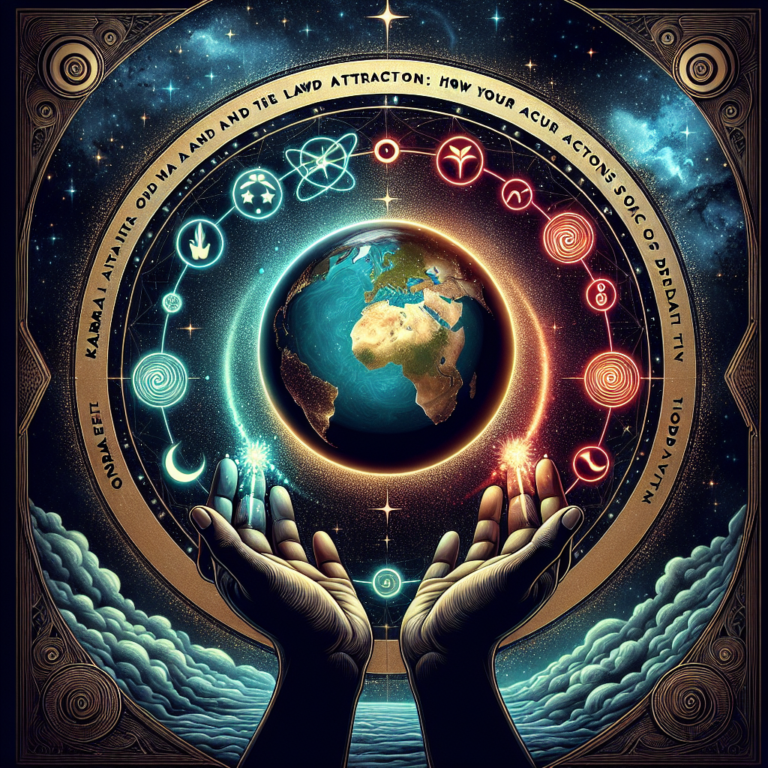Karma Misconceptions: Separating Fact from Fiction
Karma is a term that has permeated various aspects of contemporary culture, often detached from its original philosophical and spiritual contexts. It ebbs and flows through pop culture, self-help literature, and everyday conversations, frequently misconstrued or oversimplified. This article aims to dissect common misconceptions surrounding karma, illuminating its true essence, and helping readers understand the principle as it was originally intended.
What is Karma?
Karma is a Sanskrit word that translates to "action" or "deed." Rooted primarily in Hinduism and Buddhism, it encompasses the idea that every action has consequences, shaping one’s future experiences based on previous actions. It extends beyond a simple cause-and-effect mentality, promoting a deeper understanding of intention, responsibility, and moral action.
Common Misconceptions About Karma
Karma is a Cosmic Punishment System
One of the most pervasive misconceptions is that karma operates as a form of cosmic retribution. Many people believe that if they do something wrong, they will be punished in this life or the next. However, karma is not about punishment or reward in a traditional sense. It is about the natural consequences of action. For instance, if you behave kindly, you are more likely to experience kindness in return, but this is not a guaranteed outcome. The focus is more on the ethical implications of actions rather than a punitive system.Karma Works Solely in This Lifetime
Another misunderstanding is the belief that karma only affects one’s current life. In Hindu and Buddhist views, karma transcends individual lifetimes. The actions of previous lives can influence the circumstances of the current one, impacting not only individuals but also families and communities. Understanding karma in this broader context can enhance empathy and moral responsibility, knowing that our actions ripple through time and influence future generations.Karma is Instantaneous
Many people think that karma delivers its consequences immediately. This notion has led to the saying "What goes around comes around." However, karma operates over varying timelines. It can take a lifetime or even multiple lifetimes for the repercussions of an action to manifest. The delay in outcomes is a vital aspect of karma, which encourages individuals to act ethically, not out of fear of punishment but out of genuine goodwill.Karma is a Strictly Individual Experience
While it’s true that personal actions impact one’s karma, many also overlook the interconnectedness of actions within communities. Karma can be collective, affecting groups or societies. For example, systemic injustices and societal behaviors contribute to collective karma, which can have repercussions for entire communities. Recognizing this collective aspect encourages a sense of social responsibility, as the impact of one’s actions is not confined to oneself.Good Deeds Automatically Equal Good Karma
There is a popular belief that simply performing good deeds guarantees good karma. While performing virtuous acts does contribute positively to one’s karma, the intention behind the action plays a crucial role. If a good deed is done for self-serving reasons or with ulterior motives, it may not yield the positive outcome an individual anticipates. This emphasizes the importance of sincerity and compassion in all actions.- Karma is Determined by a Single Act
Many assume that karma is based solely on distinct actions. In reality, it is shaped by a multitude of factors, including intentions, the frequency of behaviors, and the context in which actions occur. A single negative action might not overshadow a long-standing pattern of positive behavior. Thus, understanding karma as a cumulative effect gives a more nuanced view of moral actions than a simplistic scoring system.
The Importance of Intention in Karma
Intention is a critical component of karma. In Buddhism, for instance, the concept of "cetana" refers specifically to intention behind actions. It suggests that the motivations behind our deeds can significantly affect their karmic implications. A selfless act driven by pure intentions will likely bear different consequences than an act cloaked in selfish motives. Thus, karma reinforces the need for mindfulness regarding one’s motivations.
How to Cultivate Positive Karma
Practice Mindfulness and Reflection: Regularly reflect on your actions and their intentions. This promotes awareness and enables you to align your behaviors with your values.
Engage in Altruism: Acts of kindness, compassion, and service without expectations can naturally cultivate positive karma.
Learn from Mistakes: When you make errors, take responsibility and learn from them. Understanding the consequences can lead to personal growth and a more profound moral compass.
Forgive and Release Grudges: Holding onto anger and resentment can create negative karmic consequences. Practicing forgiveness contributes to a lighter spirit and can foster positive karma.
- Contribute to Your Community: Engage in activities that support and uplift others, recognizing the interconnectedness of our actions.
Conclusion
Understanding karma requires moving beyond simplistic ideas to grasp the complexities of intention, action, and consequence. By addressing common misconceptions, we can cultivate a more profound awareness of our actions, leading to a more compassionate and responsible approach to life. Karma is not just a mystical concept; it is a reminder of the interconnectedness of all beings and the importance of ethical action grounded in love and compassion.
FAQs
Q1: Is karma a form of religion?
A1: Karma is not a religion itself; it is a philosophical concept found in various religious traditions, particularly Hinduism and Buddhism.
Q2: Can I change my karma?
A2: Yes, individuals can change their karma through conscious actions and intentions. Engaging in positive behaviors can lead to better outcomes.
Q3: Does karma only apply to humans?
A3: While humanity is often the focus, many believe that karma applies to all living beings, suggesting that all actions, regardless of the entity performing them, have repercussions.
Q4: How can I tell if my karma is positive?
A4: Positive karma generally manifests in positive outcomes and fulfilling relationships, but it requires introspection to determine whether your actions align with your values.
Q5: What if I experience bad things despite doing good?
A5: Karma is complex and can take time to unfold. External circumstances may not always be a direct reflection of one’s karma, as collective karma and other life experiences can influence outcomes.
It seems like you might be looking for a prompt to inspire creativity or start a conversation. Could you clarify what kind of prompt you’re looking for? For example, are you interested in writing, art, discussion topics, or something else? Let me know!, #Karma #Misconceptions #Separating #Fact #Fiction, #Karma #Misconceptions #Separating #Fact #Fiction, 1735003892, karma-misconceptions-separating-fact-from-fiction





